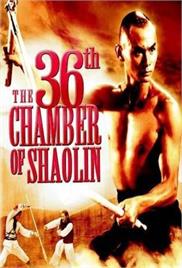Be Careful of Fake Websites. Always use HindiMovies.to domain & Join our Telegram Channel for Latest Updates.

Likes: 74
Views: 10.05K
The anti-Ching patriots, under the guidance of Ho Kuang-han, have secretly set up their base in Canton, disguised as school masters. During a brutal Manchu attack, Lui manages to escape and devotes himself to learning the martial arts in order to seek revenge. In a short period of time he masters the deadly use of his fists, feet and palms, along with such weapons as swords, sticks, and lances. With his learning complete, he takes on the Manchus.
Duration: 115 min
Released: 1979
IMDb Rating: 7.8/10 (9,071 Votes)
Genre: Action, Adventure, Drama, Dubbed Movies
Stars: Chia-Hui Liu, Lieh Lo, Chia Yung Liu, Norman Chu
Directors: ChiaLiang Liu
Writers: Kuang Ni
Year: 1978
The 36th Chamber of Shaolin is a seminal martial arts film released in 1978, directed by Lau Kar-leung and featuring an iconic performance by Gordon Liu (Chia-Hui Liu). This movie has cemented its place as a classic in the genre of kung fu cinema, celebrated not only for its thrilling action sequences but also for its compelling narrative and deep-rooted cultural elements.
Director and Writer
The film is directed by Lau Kar-leung (also known as Liu Chia-Liang), a legendary figure in Hong Kong cinema known for his authentic and traditional approach to martial arts choreography and storytelling. Lau also contributed to the screenplay, delivering a story that blends action with themes of discipline, perseverance, and enlightenment.
Plot Overview
The story is set during the Qing dynasty and follows the journey of a young scholar named San Te, portrayed by Gordon Liu (Chia-Hui Liu). San Te’s peaceful life is shattered when the oppressive Manchu government attacks and destroys his village, massacring the inhabitants. Fueled by grief and a burning desire for justice, San Te seeks refuge in the Shaolin Temple, a sacred place renowned for its martial arts mastery and spiritual enlightenment.
Determined to master kung fu and overthrow the tyrannical overlords, San Te undergoes rigorous and intense training through the temple's famous chambers, each designed to hone a specific skill set. The film's title references the legendary "36 Chambers" of Shaolin training – metaphorical stages representing mental, physical, and spiritual development.
Unlike many martial arts films simply focused on fight scenes, The 36th Chamber of Shaolin emphasizes the idea of self-improvement and discipline. It highlights how San Te not only becomes a formidable fighter but also a teacher, establishing the symbolic "36th chamber" to train laypeople and share Shaolin wisdom with the common people, thus democratizing the power that Shaolin temples hold.
Main Actors
Genre and Style
The 36th Chamber of Shaolin is categorized under action, adventure, and drama genres, and remains a definitive kung fu movie. Its blend of choreographed fight scenes, period drama, and themes of social justice made it distinct from typical martial arts movies of its time. The film’s direction by Lau Kar-leung is noted for authenticity; the fight sequences are intense, technically impressive, and impactfully staged without the use of special effects that are common today.
Legacy and Influence
This film is particularly revered for its influence on both Eastern and Western martial arts cinema, inspiring filmmakers and audiences well beyond Hong Kong. It has shaped countless works by showcasing how martial arts training ties into moral and spiritual growth, rather than mere physical combat.
Its legacy continues in various homages, including in popular culture references like Quentin Tarantino's films and hip-hop music, where the ethos and visuals of Shaolin have occasionally been evoked.
Availability and Dubbed Versions
The film has been widely distributed, including dubbed versions to make it accessible to non-Cantonese speaking audiences, further expanding its global appeal and introducing martial arts cinema to broader audiences worldwide.
Conclusion
In summary, The 36th Chamber of Shaolin (1978) stands as a masterful martial arts film that combines action, thoughtful storytelling, and cultural heritage. Directed by Lau Kar-leung and featuring a standout performance from Gordon Liu, the movie serves as an inspiring tale about overcoming oppression through discipline, skill, and compassion. Its unforgettable depiction of Shaolin training and philosophy continues to resonate with audiences and has earned it the status of a classic within the martial arts genre.